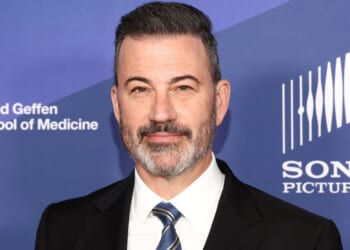As Bill Glahn has noted, Jimmy Kimmel will be back on the air tomorrow. So he didn’t even get a week off, and the dark night of fascism has evidently been staved off for the time being.
It is unfortunate that FCC Chairman Brendan Carr mused about denying renewal licenses on the ground that ABC’s programming is not in the public interest. Absent Carr’s speculation, Kimmel’s suspension would obviously have been due to the rebellion by hundreds of unhappy local stations (the Nexstar and Sinclair networks), combined with Kimmel’s money-losing status. Carr’s comments muddied the water and now have allowed Kimmel and his allies to claim victory over the hated Trump administration.
But the question Carr raised is worth considering. Should the FCC take an interest in the truthfulness or quality of programs like Jimmy Kimmel’s?
First, a couple of observations on the landscape. The FCC regulates only broadcast, not cable, television. Historically, this was based on the idea that the broadcast spectrum belongs to the public and is a scarce commodity. Further, as I understand it–and I am anything but an expert in this area–the FCC doesn’t directly regulate broadcast networks like ABC, but rather regulates individual television stations. I believe it is those stations whose license renewals would be at risk if the FCC were to crack down on network programming.
Of course, the Federal Communications Act does not give the FCC the power to determine the content of television broadcasts. Rather, the Act directs the FCC to regulate broadcast stations in the public interest. In fact, the phrase “public interest” occurs in the Federal Communications Act no fewer than 93 times. This is the section that deals with license renewals:
(k) BROADCAST STATION RENEWAL PROCEDURES.–
(1) STANDARDS FOR RENEWAL.–If the licensee of a broadcast station submits an application to the Commission for renewal of such license, the Commission shall grant the application if it finds, with respect to that station, during the preceding term of its license–
(A) the station has served the public interest, convenience, and necessity;
(B) there have been no serious violations by the licensee of this Act or the rules and regulations of the Commission; and
(C) there have been no other violations by the licensee of this Act or the rules and regulations of the Commission which, taken together, would constitute a pattern of abuse.
(2) CONSEQUENCE OF FAILURE TO MEET STANDARD.–If any licensee of a broadcast station fails to meet the requirements of this subsection, the Commission may deny the application for renewal in accordance with paragraph (3), or grant such application on terms and conditions as are appropriate, including renewal for a term less than the maximum otherwise permitted.
Historically, the FCC has done very little with that broad “public interest” standard. It seems to have monitored the airwaves mostly for obscenity. But would it really be unthinkable for the FCC to say that a local station that broadcast the Jimmy Kimmel show, if Jimmy Kimmel lies about facts (as he indisputably did with regard to Charlie Kirk’s murder) and hosts a show that is nothing but a one-sided political diatribe, is not advancing the public interest? Especially if that same station also broadcasts The View, which is a grossly ignorant commercial for one of our nation’s political parties?
“Public interest” is, of course, a broad, general standard–like due process, reasonableness, and others that are constantly applied in our laws. A station whose license is threatened with non-renewal is entitled to a hearing, and to judicial review if the FCC decides not to renew its license. So the FCC’s application of the public interest standard is hardly an arbitrary “fascist” prerogative.
Presumably, applying the public interest standard would require a review of all of a station’s programming, not just a couple of controversial shows. But, even if a station’s content is generally uncontroversial, is it outrageous to think that sponsoring a show that consists of nothing but biased, ill-founded and factually false political smears means that the station is not operating in the public interest? How about if there are multiple such shows?
For political reasons, I would prefer that Brendan Carr had not raised the issue of FCC licensing in connection with Jimmy Kimmel’s self-destruction. But as long as federal regulation of broadcast stations exists, and as long as the public interest standard is in effect, we might consider, dispassionately, whether Carr had a point.

















